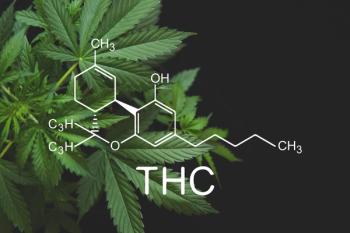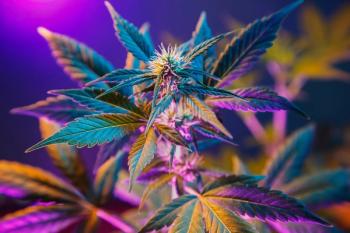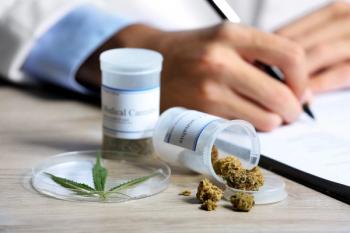
- October/November 2021
- Volume 2
- Issue 3
On the Other Side of the Nurse’s Station: A Nurse Turned Medical Cannabis Patient
Nique Pichette, MSN, RN, is a two-time breast cancer survivor who shares her unique journey to find healing with medical cannabis and the life-changing impact it had on her both personally and professionally.
In women, breast cancer is the second most common cancer, right after skin cancer (1). The best preventive care is through yearly mammograms which are able to detect breast cancer early, hopefully before the cancer has had the ability to spread. Globally, 2.3 million women were diagnosed with the illness in 2020 (2). Recent data says that about 1 in 8 women in the United States are diagnosed with breast cancer in their lifetimes (3). One of those women was Nique Pichette, MSN, RN, who was diagnosed in 2011 and re-diagnosed in 2013.
With her first diagnosis in 2011, Pichette had a full total left mastectomy. At first, her doctors were considering chemo and radiation, but opted for the mastectomy because of final lab results that came in. In 2013, only 18 months later, Pichette was diagnosed for a second time at 45 years old. “Each time you’re diagnosed, it comes back more aggressive. With my second option, the providers at Dana-Farber in Boston wanted chemo and radiation. That’s when I had to start a more aggressive type of treatment, and that’s when I started to have side effects from the different types of pharmaceuticals that I was using,” said Pichette.
Shortly after receiving her diagnosis, she created a blog on Facebook called “Breast Cancer and Me.” As a nurse, Pichette wanted to start a live journal about what it was like for a nurse facing the other side of the nurse’s station. Her blog provided a therapeutic outlet for herself and others who began following her breast cancer journey. With the negative reactions she was receiving from the different types of pharmaceuticals, online followers started recommending she try cannabis to deal with her symptoms.
“At first I was very reluctant because I was anti-cannabis. It was a drug. I was a Director of Nursing Operations at the time," Pichette explained. "I didn’t have really positive experiences with cannabis in high school or college. There were many layers of why I was afraid to use this as a treatment option. But I was allergic to the antiemetics, which are the medications that help with nausea and vomiting and stuff from the side effects of chemotherapy. I was emaciated. I was down to about 111 pounds. I was bald, I was frail and I was sick, and I was still working. I was trying to find how I could move forward with this."
Pichette was also in remission from anorexia. "In my younger years, I suffered from severe anorexia. When I saw these pictures of myself, I didn’t want to fall back on the wagon of anorexia and knew that I had to do something," she said. "I reached out to Steve Placek from Pennsylvania, who was the most persistent on my blog telling me, 'you need to try this, you need to try this.' So, I reached out to him and said, as a nurse and a cancer patient, how do I do this legally so I can try to get better and so I don’t lose my license?”
At the time, Pichette was living and working in Rhode Island. When she began researching medical cannabis, Rhode Island was a medically legal state. Even with medical use legalized, cannabis was considered illegal at the federal level. As a nurse, Pichette had the possibility of losing her nursing license if she chose to use cannabis and failed a drug test for tetrahydrocannabinol (THC). At that point in her life, with battling a terminal illness or potentially terminal illness, she had to make a personal choice of what was most important to her and weigh the risk/benefit ratio. During this period of time, the benefits of medical cannabis outweighed the risk. Pichette felt that she had to do something at that point to change her life.
Life Changing Moments
In Rhode Island, Pichette was able to pick a dispensary and a caregiver. Army veteran, Chapman Dickerson, filled the role of her caregiver and would come to her house with a care package of all different types of cannabis products such as edibles, tinctures, drinks, and topicals. Dickerson spent a significant amount of time teaching Pichette and helping her understand what she was doing. As she began to heal through her breast cancer treatment side effects, Pichette started digging deeper into the research and education on the medicinal cannabis.
Through her research, she came across Nurse Marcie Cooper who connected her to Patients Out of Time. In this organization, Pichette was introduced to Nurse Heather Manus, who was a part of the education team for Patients Out of Time. In one of Nurse Heather’s sessions, Pichette was mesmerized by her knowledge of the endocannabinoid system, the cannabis plant, and her style of storytelling and healing. As a nurse, Pichette had never learned about this bodily system.
With all of this education on cannabis and the endocannabinoid system, Pichette now assists other breast cancer patients along their journey but doesn’t help them through a nursing approach. Instead, Pichette talks with them from a patient perspective of how her journey with cannabis was during her breast cancer diagnosis. An important and often forgotten aspect of breast cancer is mental health. Pichette explained that people often focus on the cancer and not about how such a scary diagnosis can affect the mind and spirit. Cannabis helped Pichette realize that she was much more than her breast cancer diagnosis, even after losing one of her breasts. These are some of the topics she discusses with fellow patients.
Through surviving her double breast cancer diagnoses, Pichette is still a cannabis user today, more so to support her mental health. It is unknown if cannabis is helping her stay in remission, but the medicinal plant has done wonders for her mental health. Now, she is not taking any pharmaceuticals, except for her asthma. Cannabis has assisted in allowing her to live her life in a more peaceful, positive mindset.
Finding Her Own Treatment Plan
While receiving her medical treatment at Dana-Farber Cancer Institute in Boston, Massachusetts, medical cannabis was still considered taboo, so doctors were not interested in recommending it’s use in her treatment plans. Harvard University is connected with the institute. Dana-Farber had a volunteer program that was similar to a buddy system, connecting newly diagnosed breast cancer patients and helping them with things new patients are faced with. Due to her cannabis use, Pichette was denied involvement in the program.
Pichette’s journey with cannabis wasn’t an easy one. The negative effects of cannabis aren’t often discussed out in the open. Pichette suffers from a high sensitivity to THC and would experience paranoia at times. To begin use, she was micro-dosing 2.5 milligrams of THC a day. In 2013–2014, Pichette said she wasn’t getting information on micro-dosing from her dispensary. Soon Pichette began working with Nurse Heather, whose Nature Nurse product helped significantly with micro-dosing her endocannabinoid system. Pichette kept a log of which products were working and which weren’t. It was a lot of trial and error, trying to figure out her medical cannabis treatment plan. Now, she is able to micro-dose her way into wellness by using the right products. When Pichette goes to a dispensary, she has to keep note of the percentage of THC. Another cannabinoid she needs to look into percentages is cannabidiol (CBD) or else she would have negative side effects.
Luckily for Pichette, acquiring medical cannabis wasn’t a difficult task like the trials and errors of product testing. She has lived in Rhode Island, Massachusetts, and California, which are all states where breast cancer is a qualifying condition. Each state has their own guidelines though so now being in Rhode Island, Pichette is unable to access to the THC part of Nature Nurse products. Unless she visits California, she is not able to receive the products that work best for her. Even while travelling, Pichette has the hurdle of crossing state lines with cannabis products, which depending on where you are going may become a challenging issue. There are other products that are available, but the Nature Nurse product line suits Pichette’s needs best. “Everybody has their own desired medication just like pharmaceuticals. And that’s the hard part is if you find a strain, if you find a product, and then that strain is no longer available or that product is no longer available. Now, you have to go through all of those hoops again trying to find where you’re at, what state you’re in, and what’s available to you," said Pichette. "Then you have to start all over again because each product is different. At least for me, that’s what I found.”
An important thing to note with cannabis is that it may not be suited for use while a patient is on other medications. Although it is a safe plant in which you cannot overdose through its use, cannabis may interact negatively with certain types of pharmaceuticals and bodily functions. Pichette mentioned that cannabis has the possibility to increase your heart rate or lower your blood pressure. “I know one of the big things is if you’re on an anticoagulant, if you have any blood clotting factors, it can change your prothrombin time/international normalized ratio (PT/INR). That way, you might need less anticoagulation. There are different medications that would have to be titrated whether up or down,” she said.
Due to the possibility of unfavorable pharmaceutical reactions, Pichette always instructs patients to work with a medical professional and also someone who had a medical background in cannabinoid therapeutics and the endocannabinoid system.
Addressing Stigma
Due to the stigma of cannabis and its’ federal substance ruling, many breast cancer patients may not be aware of the medicinal health benefits it can offer. Pichette is still actively working as a nurse in a psychiatric unit. When she was the acute psychiatric hospital night supervisor for a year and a half, she kept seeing the erroneous diagnosis of Cannabis Use Disorder and this led to her research study at Salve Regina University, in which she hopes to graduate with her Doctorate in Nursing Practice in May 2022. Being surrounded by nurses and doctors day-to-day, she witnesses the stigma surrounding cannabis and says it is still significantly high. A lot of breast cancer patients might have little to no education of cannabis’s effects on the body because of the lack of knowledge on it throughout their care team. Many hospitals are also fearful that they will lose their federal funding if they participate in referring patients to cannabis.
Pichette hopes that cannabis becomes more accepted among employers. As with some jobs, employers may opt for employees to take drug tests to prove that they aren’t using illegal substances. “I use cannabis, but I am not impaired. If I were to get drug tested, I would be positive for THC. And people don’t understand a drug test for THC and how to use cannabis medicinally,” said Pichette.
She mentioned that there are a lot of people out there, including medical professionals and big corporation executives, that still believe that cannabis is only about smoking a joint and getting high. They aren’t familiar with the various alternative routes, such as tinctures, patches, topicals, and so on.
Pichette would like to see the option for medical patients to be able to access their cannabis in the hospitals while they are undergoing treatment. Such a stature was seen in California with the passing of Ryan’s Law. “That’s huge because when you’re on the outside of the traditional system and you’re using cannabis as medicine and you would then have to go to an inpatient stay or you’re in the emergency room or in even sometimes a hospice setting, there are certain places that deny you the right to use cannabis as medicine," she said. "We’re supposed to do no harm. And we’re supposed to take this oath about the other ethical position that we’re supposed to take as healthcare professionals. Yet we’re under the scrutiny of—I’m not really sure what it’s called, but I supposed it's Big Pharma or it’s unfortunate, but it comes down to money. That is my opinion and what I’ve seen through my journey with medical cannabis.”
Cannabis helped Pichette incorporate the mind and the spirit in her journey to healing. “I’ve learned over my journey that spirit is breath and breath is life. We have to breathe for life, and nurses know that in Maslow’s hierarchy of needs, airway is the top priority," she said. "But when you move to cannabis, it helped me understand that breath in life is about love. And I learned through my breathing and adding plant medicine that I learned how to start to love myself and heal all the broken parts of me from the inside out. That for me, personally, pharmaceuticals that I tried in the past to help me through that recovery numbed those emotions and hid those emotions.”
Cannabis helped Pichette on her internal journey of finding who she was authentically, understanding that it was okay to be herself with a mastectomy, with her mental health issues, and becoming the person that she is today.
Founding the Cannabis Nurse Navigator
After her second bout with breast cancer, Pichette created her clothing line called “Nique Wear,” which was a cannabis and body building brand, and became a part of a program called “Entrepreneurs For All” (4). Through this program, Pichette was asked what she was planning to do with the clothing line and why she was not utilizing her skills as a nurse. She then revamped her brand into the “Cannabis Nurse Navigator.” This program is dedicated to helping patients and their families navigate their way through the medical care system, be a part of the treatment team, and to also be a voice to help other patients and doctors bridge the gap between the mind, body, and spirit medicine. Pichette is currently getting her graduate degree in this space—focused on debunking cannabis use disorder and justifying the need for a Cannabis Nurse Navigator position. She hopes to see the Cannabis Nurse Navigator as an official position for nurses at hospitals and other healthcare facilities one day.
Pichette is also involved with the Cannabis Nurses Network (CNN). In this global network of nurses, Pichette tries to assist in whatever way she is capable in bridging cannabis nurses together in love. Pichette was humbled to be part of Dr. Carey Clark’s book Cannabis Nurse Handbook, who was also the past president of the American Cannabis Nurses Association (ACNA). “It takes a village and we’re really trying to bring together all of us. Because as cannabis nurses, if we could all work together, what a different force that we could emulate and bring about the much-needed revolution in health care,” said Pichette.
Cannabis has the power to heal and unite people in the breast cancer community, among many others. It’s certainly not the path Pichette saw herself taking nor did she expect to be sharing with the world. “I’m really humbled and honored, and I never, ever thought that my life would be where it is today. And through this and through Nurse Heather and my journey with cannabis I have been able to take her theory on Post Traumatic Growth, The Lotus Theory, and take a petal off the lotus flower and turn my cannabis experience into Positively Processing Perception (5). And help people change their perception and change their life."
Pichette hopes that other breast cancer patients and survivors may be touched by her story. Through her discussion of her dual breast cancer diagnoses and medical cannabis journey, others may be inspired to look deeper into alternative routes in their healthcare and receive the positive benefits she found with the cannabis plant.
References
(1)
(2)
(3)
(4)
Articles in this issue
about 4 years ago
October/November 2021 Digital Editionabout 4 years ago
Tackling Breast Cancer with Medical Cannabisabout 4 years ago
Talking with Your Doctor About Medical Cannabis and Breast Cancerabout 4 years ago
Overview of Research on Cannabis for Breast CancerNewsletter
Unlock the latest breakthroughs in cannabis science—subscribe now to get expert insights, research, and industry updates delivered to your inbox.




